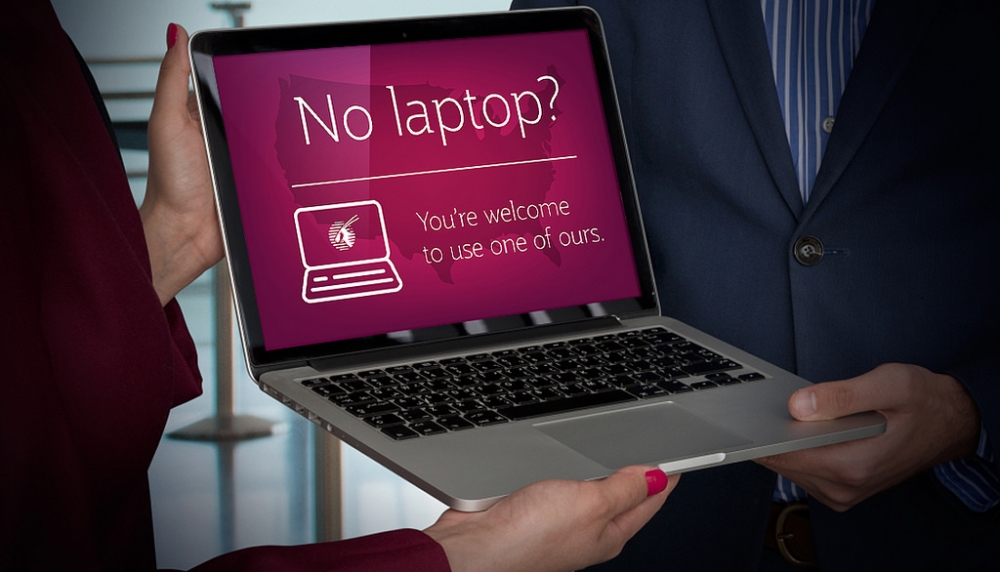The Department of Homeland Security has described as incorrect competing claims that the controversial laptop ban will be expanded worldwide and that US officials have shelved plans to extend it to Europe.
Both claims were aired in British media this week, one on the BBC and the other in the Financial Times, amid a backlash prompted by reports of plans to extend to Europe the ban on carrying laptops and other large electronic devices as cabin baggage on direct flights to the US.
But DHS spokesman David Laplan told AirlineRatings said neither claim was correct.
Laplan said he had reiterated previous comments to the FT that an expansion beyond the airports announced in March is still under consideration and it might include “Europe and other areas” but he had not said it would be a worldwide extension.
The BBC had inaccurately reported that the DHS had decided against a ban, he said.
“Expansion of restrictions announced in March remains under active consideration by the Department of Homeland Security,’’ Laplan said “There is no timeline for a decision. Secretary Kelly will do what he determines is in the best interests of air travellers from all nations travelling to the US.’’
The International Air transport Association has warned that extending the ban to Europe could cost passengers more than $US1 billion.
The airline industry group argued the ban would disrupt transatlantic business and puts the cost of a ban at $US655 million in loss of productive time, $US216m in travel delays at airports and $US195m in reduced well-being.
The estimate came as US and European officials met in Brussels on Wednesday to discuss the proposal which has generated fears of airport chaos in Europe.
The US has already put in place a similar ban on direct flights from Middle Eastern and North African airports because of fears explosives could be hidden inside larger electronic devices.
The European ban could affect more than 3200 weekly flights to the US from 28 European countries, although the US has yet to reveal which countries would be targeted.
Wednesday’s meeting involved the European Commissioner for Migration, Home Affairs and Citizenship, Dimitris Avramopoulos, and European Commissioner for Transport Violeta Bulc but not the head of the Department of Homeland Security, John Kelly.
Instead, it fell to deputy secretary Elaine Duke to field the European concerns but there will be another meeting in Washington, D.C. next week “to further assess shared risks and solutions for protecting airline passengers, whilst ensuring the smooth functioning of global air travel’’.
In a joint statement, the DHS and EC said both sides exchanged information on serious evolving threats to aviation security and how to confront them.
“Participants provided insight into existing aviation security standards and detection capabilities as well as recent security enhancements on both sides of the Atlantic related to large electronic devices placed in checked baggage,’’ the statement said.
In an interview with Bloomberg TV, IATA director general Alexandre de Juniac said airlines were not sure that the laptop ban was appropriate to the threat and airlines did not know the nature of intelligence justifying the measure.
De Juniac said IATA had asked authorities to work closely with the industry so they could take the right measures and not cause too much disruption to the airline business or the lives of passengers.
While he conceded the Americans were discussing the issue with other governments and the industry, he emphasised the need to draw on the expertise of airlines.
“We transport 10 million people every day, we transport 50 million tonnes of goods every year,’’ he said. “So we do not claim to be genius but we claim to be the specialist people in transporting goods so we can provide, we think, the appropriate and right advice when it comes security and protection measures for passengers and for our trade.’’
The IATA boss said he hoped that the appropriate measure could be found to deal with the threat, pointing to electronic explosive trace detectors already in place in many airports, increased training and random checks of electronic devices.
DHS boss Kelly has said in a previous interview on CNN that he was kept up at night by fears of an attempt by terrorists to knock down a plane in flight.
Kelly said the US was considered a hard target because of the security measures it had in place but it was hearing threats “all the time’’ in the chatter between terrorists.
“Some of the chatter is real, some of it is specific and in an abundance of caution we have decided to date decided to at best inconvenience travellers at certain airports on the way to the United States,’’ he said about the existing laptop ban.
Kelly said he would rather have passengers forced to read a book or magazine than have “a flaming ball of fire coming down from 30,000ft’’.
Asked about the expansion, Kelly said: “We’re constantly looking, constantly listening, constantly trying to figure out what they’re doing.
“And I would have no hesitation to expand the limitation on carrying electronic devices on airplanes bound for the United States if the threat and my evaluation of that threat brought me to that point. No hesitation at all.’’
The meeting in Brussels came as Australia has said it was working closely with other governments on the issue and will take steps if necessary.
Read our story on the Australian response.
Reports that the US was looking at extending the ban on laptops and other large electronic devices to airlines in Europe emerged last week.
The initial ban was imposed in March on direct flights to the US from 10 airports in North African and Middle Eastern airports. The airports were: Cairo (Egypt), Istanbul (Turkey), Dubai (United Arab Emirates), Abu Dhabi (United Arab Emirates), Kuwait (Kuwait), Doha (Qatar), Casablanca (Morocco), Amman (Jordan), Riyadh (Saudi Arabia) and and Jeddah (Saudi Arabia)
Britain implemented a similar ban but exempted Emirates’ home base of Dubai, Qatar’s hub in Doha and Etihad’s home in Abu Dhabi.
An extension of the bans would prove a major headache for airlines and business travellers. It could exacerbate airport bottlenecks and raises questions about insurance coverage of valuable devices packed in aircraft holds.
A meeting between airlines and US government officials was held last Thursday US time and multiple sources said they expected an announcement from the Department of Homeland Security.
However, the Journal reported there was no decision made by DHS Secretary Kelly, who was at the meeting, and a spokesman told the newspaper there was no specific timeline for a policy change but officials were continuing to evaluate threats.
European airlines are said to be preparing for the announcement, although it is not yet clear which countries would be affected and whether the ban would also take in other regions such as the Asia-Pacific.
Gulf carriers affected by the March ban have introduced a range of options to help passengers, including services which collect laptops at the gate and providing loaner laptops or tablets.
Medical equipment and small devices such as smartphones are not affected by the ban on taking bigger devices into aircraft cabins.
A major issue raised at the time and still under discussion is how to safeguard against a concentration of lithium batteries in aircraft holds.
There have been instances of the batteries catching fire on aircraft but they have been contained because many involved devices that were readily accessible in the cabin.
The US reports indicated a review into this issue was one of the factors holding up an announcement.
The March bans also prompted claims that Gulf carriers had been unfairly singled out and suggestions that this was due to arguments by the big three US carriers that they were the victims of unfair competition.
Travel industry group the US Travel Association said it was critical for the US government to clearly communicate details of the new policy and reason it was needed.
Spokesman Jonathan Grella said the government would also need to continually re-assess the policy to make remained relevant and effective while actively seeking protocols to minimise disruption to travellers.
“If there is a legitimate terror threat, the flying public needs to take it seriously and adjust to the new protocols as best they can,’’ Grella said in a statement. “Travellers have been through this kind of thing before and are more resilient than we often think—plus the consequences of a major attack on the transportation system hardly need to be repeated.’’
IATA was critical of the original bans and called on governments to find an alternative.
Read: IATA critical of inconsistent laptop bans.
US authorities at that time did not detail any new incidents triggering the ban but said they had seen intensifying propaganda from terrorist groups encouraging attacks on aviation.
In a Q&A released by the Department of Homeland Security, the US said it was concerned about terrorists “ongoing interest in targeting commercial aviation, including transportation hubs over the past two years, as evidenced by the 2015 airliner downing in Egypt, the 2016 attempted airliner downing in Somalia, and the 2016 armed attacks against airports in Brussels and Istanbul”.
“Evaluated intelligence indicates that terrorist groups continue to target commercial aviation, to include smuggling explosive devices in various consumer items,’’ it said.
Commenting on the trend that prompted the concerns, the DHS said: “Although the U.S. has instituted robust aviation security measures since 9/11, our information indicates that terrorist groups’ efforts to execute an attack against the aviation sector are intensifying given that aviation attacks provide an opportunity to cause mass casualties and inflict significant economic damage, as well as generate overwhelming media coverage.
“We note that disseminated propaganda from various terrorist groups is encouraging attacks on aviation, to include tactics to circumvent aviation security. Terrorist propaganda has highlighted the attacks against aircraft in Egypt with a soda can packed with explosives in October 2015, and in Somalia using an explosives-laden laptop in February 2016.’’
























